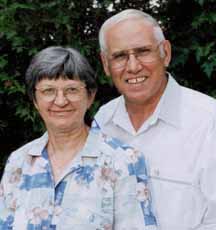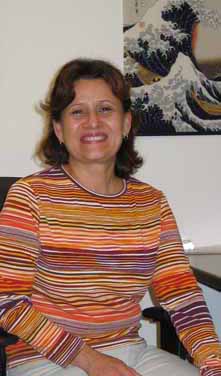Canadian Mennonite
Volume 11, No. 01
January 8, 2007

Stewardship stories of the generous life:
Generosity through the generations
 |
With this UpClose article, Canadian Mennonite begins a series of six “stewardship stories for the generous life” that will be printed throughout 2007. These profiles of generous Christians were originally published in 2004-05 by the MC Eastern Canada Stewardship Commission and are reprinted with permission.
How would you define generosity? Herb and Shirley Schultz of New Hamburg, Ont., answer that question by telling stories from their childhood, describing the generosity modelled by their parents.
When Shirley’s uncle vanished without a trace, leaving behind his wife and seven children, Shirley’s parents made monthly deliveries of food to the struggling family. For two years, they made space in their own home for one of the children.
Her mother also reached out to strangers. Those wandering down the road received a good meal from her kitchen and she spent countless hours making garments and comforters for relief at “sewing circle.” Reading church papers and newspapers kept her keenly aware of world events and needs to which she could respond.
Shirley also remembered her father giving money to help buy a house and car for missionary families from Argentina to use while back home in Ontario on furlough. He gave generously without keeping careful account.
Herb’s parents also modelled generosity, a term they would not have spoken. Not wealthy, they shared what they had, beginning with setting aside a 10th of the cash they received bi-weekly from the milk they produced. On Sunday, they took the money from the kitchen cupboard and put it on the offering plate. They also gave each child money for Sunday school offerings.
“I don’t remember talking about tithing; I just saw it,” Herb reflected. It was a principle he adopted, always carefully tithing his meagre earnings and even the small cash gifts he received during lean college days.
Shirley also credits the influence of chapels at Rockway Mennonite School, where she learned to “walk the talk.” She still recalls the delight of putting 10 percent of her first teacher’s pay cheque into the offering plate.
While they started with tithing, Herb and Shirley have moved beyond legalism to giving as an act of worship out of gratitude to God. Theirs is the kind of generosity Paul talks about in II Corinthians 8-9, which includes giving in both good and difficult times.
The Schultzes have experienced both. Herb, who began his career as a pastor in 1955, was still receiving a quarterly love offering from the church when he and Shirley were married in 1959. If a storm blew up on the designated Sunday, they knew both attendance and the offering would be low, but they didn’t fudge their tithe! Additional gifts in kind, like the chunk of beef dropped off by one of the poorest farmers in the church, were humbling but welcome. Shirley acknowledged that until the church began paying Herb a salary of $400 a month in 1967, they often “lived on love and eggs.”
When the Schultzes became parents, they followed the example of their parents, helping their three daughters pack Christmas bundles and school kits. They were pleased to see their girls develop generous spirits. When their pet gerbils turned out to be a prolific pair, the girls sold the young gerbils and gave all the money—$29—to a mission project. The daughters, now adults with their own families, along with Herb and Shirley, usually choose MCC projects to support at Christmas, rather than giving gifts to each other.
Herb and Shirley do not confine giving beyond the church budget to Christmas. When a need arises, they write a cheque, no matter what level of giving their tax return records. Generosity is a way of life throughout the year.
One of their greatest gifts is hospitality, practised over many years. Among dinner guests have been all the girls’ teachers from Kindergarten through Grade 8, as well as international students and Rockway friends, some of whom have kept in touch for decades.
Their gift of time includes serving as local volunteers at the Ten Thousand Villages warehouse. During a four-month sabbatical in the Middle East and Africa in 1992 they saw how products sold through organizations like Ten Thousand Villages helped the creators of those products achieve a better life for their families. They also saw raw poverty, the memory of which still makes them weep.
Herb and Shirley seem content with the realities which may lie ahead—like further downsizing and receiving from others. In the meantime, they plan to continue giving time and money, paying attention to what they really need and what they can do without, practising hospitality, enjoying their family, modelling generosity for their grandchildren, and being grateful to God for God’s faithfulness and generosity to them.
Refugee coalition director named
a Waterloo Region Woman of the Year
Waterloo, Ont.
 |
Eunice (u-ni-tse) Valenzuela, director of the Mennonite Coalition for Refugee Support, has been chosen as one of Waterloo Region’s seven “Rogers’ Women of the Year for 2006” for her work as director of the coalition, a position she has held since 2002.
“When I came to Canada in 1991, I thought that people should pronounce my name correctly,” she said gently when asked how to spell her name. This regard (pride) for herself as a person might seem out of place among Mennonites, but it fits well with Valenzuela’s comprehension of God’s call to Christians. Beginning with love of self, she exhibits love of others and love of God as well.
In 1991, Valenzuela, together with her husband, was a refugee. From her father and mother she had learned that people should care for those who are poorer than themselves. “He would give meat to the poor every December 24 so that they would have something to celebrate with,” she recalls.
This justice ethic led her to found Base Christian Communities in Esteli, a city in northern Nicaragua. Together with a Roman Catholic priest, she helped organize the city into local communities to pray; to supply water, food and first aid; and to give a voice to all the people. This was begun before the socialist Sandinistas came to power and continued under their government. She continued this work in the countryside around the city of Condéga, in spite of the activities of the Contra guerrillas in the area.
An election brought the Contra supporters to power in 1991 and Valenzuela decided that her homeland had become too unsafe for her. “When I left, it was not to go to Canada, it was to go to where I and my family could be safe,” she says. Her husband was in Canada already, having left earlier because of his political beliefs.
Her first experience of Mennonites came on Jan. 11, 1991, when a Mennonite family from Kitchener picked her up from Fort Erie, Ont. They opened their home and lives to her, welcomed her into their congregation (Kitchener Mennonite Brethren), and helped her settle in Canada.
At first, Valenzuela’s application for refugee status was denied. She feels it was due to the political views of some of those on the examination board. But she was allowed to stay because her husband had been a target of the Sandinistas. In 1996, she received landed immigrant status and was then reunited with her son Carlos Jose after five years of separation. She became a citizen in 1998.
It was her passion for the poor—including the stranger—that brought her to work with the refugee support coalition in 1992, while she was classified as a refugee herself. Her motivation, then as now, was to build a community where all cultures, religions and economic levels can live together in peace. She believes that Christians need to experience first-hand different cultures so as to passionately help others have an easier time. This, she believes, is what God has called her to do.
Interestingly, although she worked with the Catholic Church, it was more humanitarian than Christian for her. But when she returned to Nicaragua in 1998, when she could travel on a Canadian passport, a different view of her work there was brought to her by a complete stranger.
Walking in Condéga, a woman called to her. Valenzuela went up to her and the woman said, “So you are alive. Every day when you went by my store out into the countryside, I prayed for you. And when you would return in the evening, I gave God thanks.”
Valenzuela didn’t recognize God’s help then, but does now. She finds traditional Mennonite churches too constraining and worships in the Dwelling Place, a Mennonite Brethren congregation striving to build community in a poor area of Kitchener.
“We work with the community, within it…not doing something to it,” Valenzuela says. “The community, including the refugees, has gifts to give us. Work with the community means not impressing our values on them. Instead, we humble ourselves to process and work together.”
Klassen named Canada’s 2006 athlete of the year
Winnipeg
For Olympian Cindy Klassen, 2006 was a banner year. It began with her five medals in Turin last February, followed by her winning the world all-around speed skating championship in Calgary, and ended with her being awarded the Lou Marsh Award as Canada’s best athlete and the Bobbie Rosenfeld Award as Canadian female athlete of the year. In between, she became a spokesperson for Mennonite Central Committee’s Global Family program (aidscarenow.org) and she received an honorary doctorate from the University of Manitoba.
Yet in the midst of all this acclaim Klassen continues to respond with surprise, gratefulness and a shy grace which has captured the hearts of Canadians, quickly directing attention away from herself to how her successes can help others.
After the announcement about the Lou Marsh Award, she expressed “surprise” and noted that “the greatest thing about it is that it went to an amateur athlete, and I think because of that our sport will get more exposure. And that’s really exciting. More kids will get into skating.”
Klassen acknowledges that the prayerful support of family, friends and her church community is “huge” for her, making her feel “at peace” as she skates all over the world.